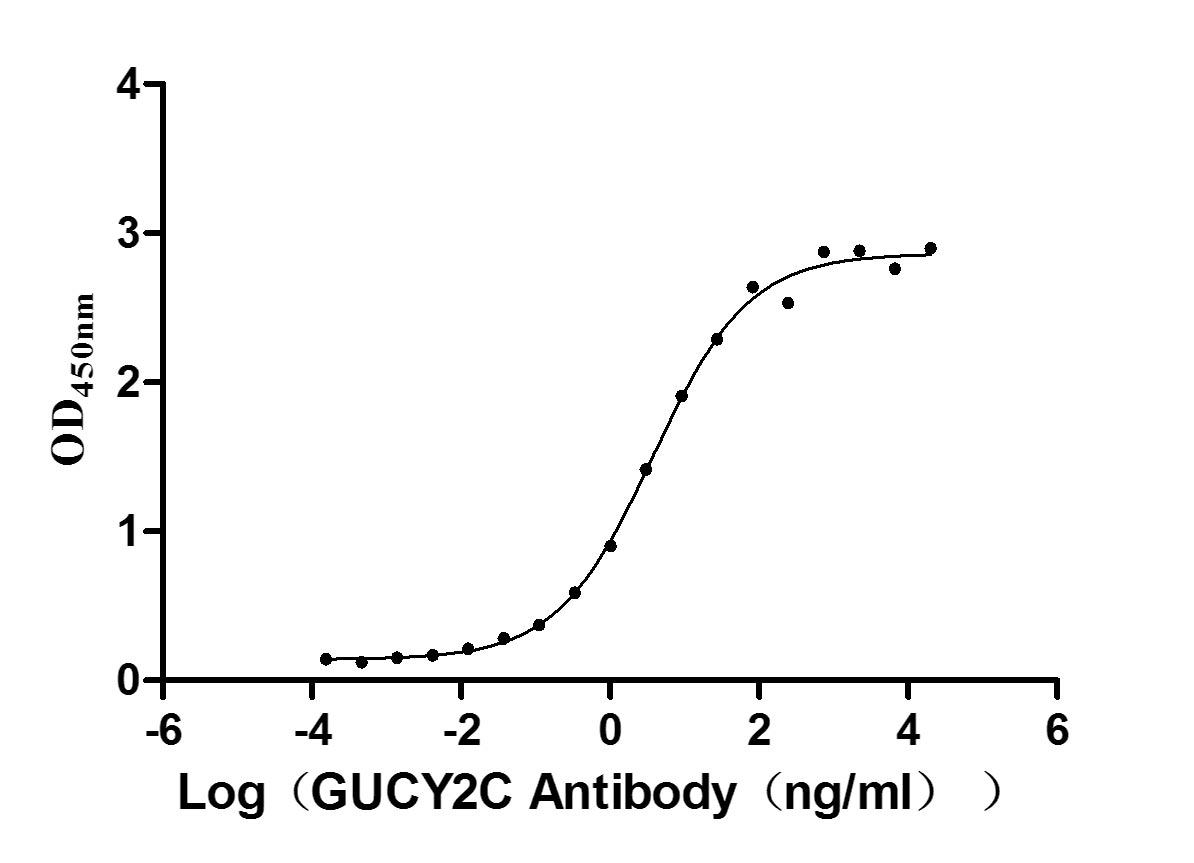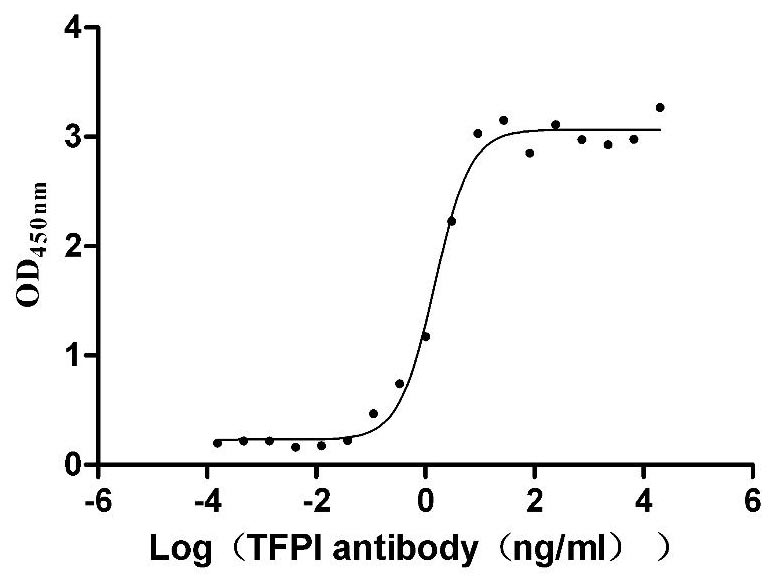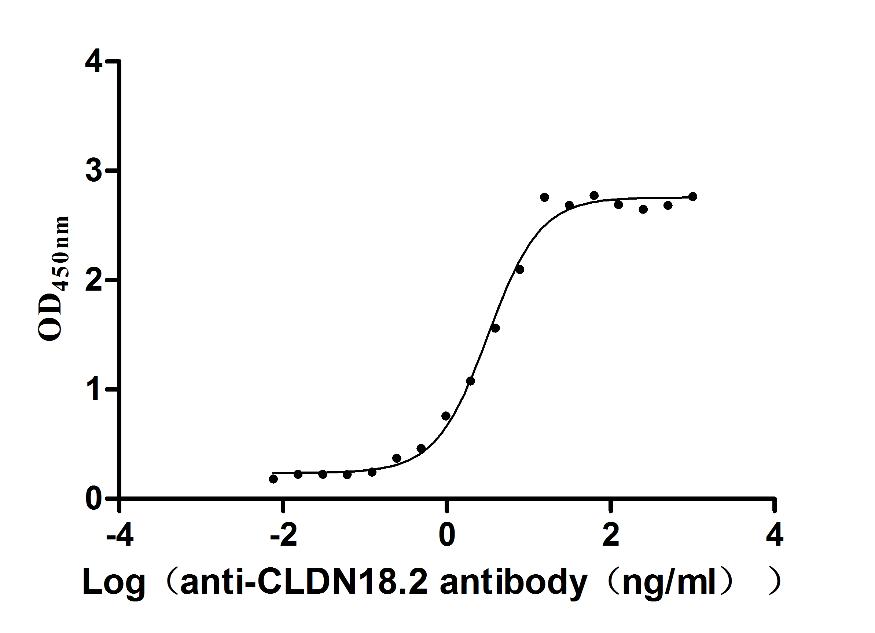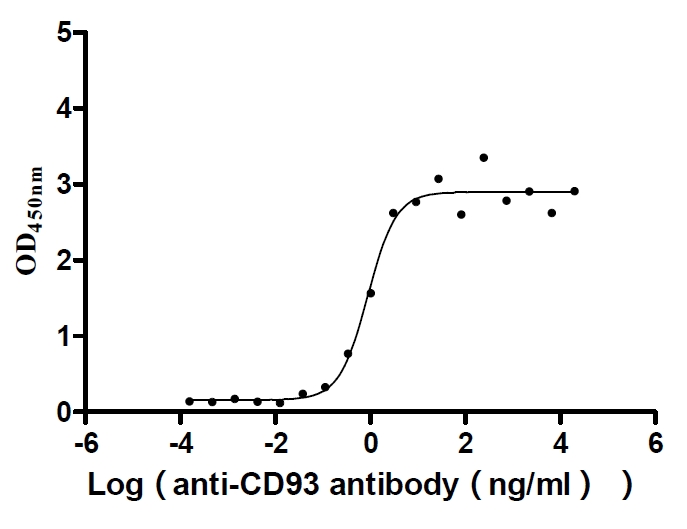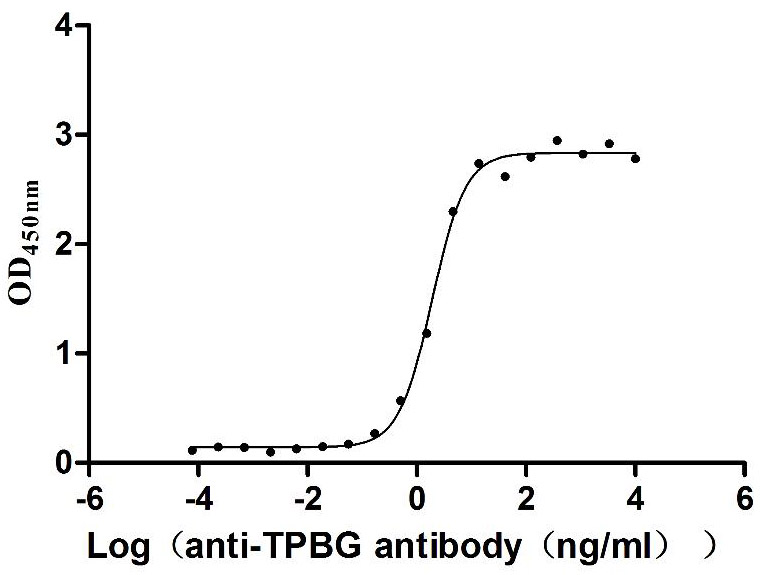Recombinant Human Titin (TTN), partial
In Stock-
中文名称:人TTN重组蛋白
-
货号:CSB-RP150794h
-
规格:¥1536
-
图片:
-
(Tris-Glycine gel) Discontinuous SDS-PAGE (reduced) with 5% enrichment gel and 15% separation gel.
-
Based on the SEQUEST from database of E.coli host and target protein, the LC-MS/MS Analysis result of CSB-RP150794h could indicate that this peptide derived from E.coli-expressed Homo sapiens (Human) TTN.
-
Based on the SEQUEST from database of E.coli host and target protein, the LC-MS/MS Analysis result of CSB-RP150794h could indicate that this peptide derived from E.coli-expressed Homo sapiens (Human) TTN.
-
-
其他:
产品详情
-
纯度:Greater than 90% as determined by SDS-PAGE.
-
基因名:
-
Uniprot No.:
-
别名:MPRM; Cardiomyopathy dilated 1G (autosomal dominant); CMD1G; CMH 9; CMH9; CMPD 4; CMPD4; Connectin; DKFZp451N061; EOMFC; FLJ26020; FLJ26409; FLJ32040; FLJ34413; FLJ39564; FLJ43066; HMERF; LGMD2J; MU RMS 40.14; MYLK5; Rhabdomyosarcoma antigen; Rhabdomyosarcoma antigen MU RMS 40.14; Rhabdomyosarcoma antigen MU-RMS-40.14; Titin; TITIN_HUMAN; TMD; TTN
-
种属:Homo sapiens (Human)
-
蛋白长度:Partial of Isoform 6
-
来源:E.coli
-
分子量:26.5kDa
-
表达区域:5398-5604aa
-
氨基酸序列VFKCSVIGIPTPEVKWYKEYMCIEPDNIKYVISEEKGSHTLKIRNVCLSDSATYRCRAVNCVGEAICRGFLTMGDSEIFAVIAKKSKVTLSSLMEELVLKSNYTDSFFEFQVVEGPPRFIKGISDCYAPIGTAAYFQCLVRGSPRPTVYWYKDGKLVQGRRFTVEESGTGFHNLFITSLVKSDEGEYRCVATNKSGMAESFAALTLT
Note: The complete sequence including tag sequence, target protein sequence and linker sequence could be provided upon request. -
蛋白标签:N-terminal 6xHis-tagged
-
产品提供形式:Liquid or Lyophilized powder
Note: We will preferentially ship the format that we have in stock, however, if you have any special requirement for the format, please remark your requirement when placing the order, we will prepare according to your demand. -
缓冲液:Tris-based buffer,50% glycerol
-
储存条件:Store at -20°C/-80°C upon receipt, aliquoting is necessary for mutiple use. Avoid repeated freeze-thaw cycles.
-
保质期:The shelf life is related to many factors, storage state, buffer ingredients, storage temperature and the stability of the protein itself.
Generally, the shelf life of liquid form is 6 months at -20°C/-80°C. The shelf life of lyophilized form is 12 months at -20°C/-80°C. -
货期:3-7 business days
-
注意事项:Repeated freezing and thawing is not recommended. Store working aliquots at 4°C for up to one week.
-
Datasheet & COA:Please contact us to get it.
相关产品
靶点详情
-
功能:Key component in the assembly and functioning of vertebrate striated muscles. By providing connections at the level of individual microfilaments, it contributes to the fine balance of forces between the two halves of the sarcomere. The size and extensibility of the cross-links are the main determinants of sarcomere extensibility properties of muscle. In non-muscle cells, seems to play a role in chromosome condensation and chromosome segregation during mitosis. Might link the lamina network to chromatin or nuclear actin, or both during interphase.
-
基因功能参考文献:
- Among the 120 dilated cardiomyopathy patients, 20 (16.7%) had TTN truncating variants. PMID: 29386531
- In a case-control study, there was a statistically significant association between an LOF variant in the TTN gene and early-onset AF, with the variant present in a small percentage of participants with early-onset AF (the case group). PMID: 30535219
- novel titin gene-truncating mutation NM_001267550: p.Leu23499fs/c.70497_40498insT found in the proband as well as in her mother in woman with peripartum cardiomyopathy PMID: 29997384
- Titin isoform expression differs in aortic stenosis and aortic regurgitation as adaptive response to different pathophysiologic scenarios. PMID: 29472025
- TTN missense variants were commonly identified in arrhythmogenic cardiomyopathy patients in this cohort, but did not appear to play a primary role in ACM as causative variants. PMID: 29750433
- This is the first study to suggest the involvement of the novel missense CACNA1C c.1786G>A and TTN c.49415G>A variants in the inheritance of symptomatic bradycardia and development of sick sinus syndrome. PMID: 29568937
- We employed WES to detect the mutations of DCM patients and identified 2 novel mutations. Our study expands the spectrum of TTN mutations and offers accurate genetic testing information for DCM patients who are still clinically negative. PMID: 27544385
- urinary concentration of titin correlated significantly with serum creatine kinase concentration, the best-known biomarker of Duchenne muscular dystrophy; the N-terminal fragment of titin in urine has potential as a diagnostic and clinical biomarker for DMD PMID: 29175173
- we considered titin fragments as promising candidates for reliable and non-invasive biomarkers of muscle injury. PMID: 27991570
- TTN plays a role in regulation of cardiac electrical conductance and coupling, and is a risk factor for cardiac arrhythmias and sudden cardiac death PMID: 27321809
- The T-allele at rs10497520 in the TTN gene is associated with shorter skeletal muscle fascicle length and conveys an advantage for marathon running performance in habitually trained men. PMID: 28581678
- An overview of the different neuromuscular disorders caused by mutations in the TTN gene, reviewing the molecular findings as well as the clinical data (review). PMID: 27854229
- This review considers data on structural and functional features of titin, on the role of this protein in determination of mechanical properties of sarcomeres, and on specific features of regulation of the stiffness and elasticity of its molecules, and possible amyloid aggregation of this protein PMID: 29523065
- Exome sequencing was conducted and a novel mutation c.107788T>C (p.W35930R) in the titin gene (TTN) was identified. PMID: 26392295
- Study found that there is a missense mutation in the TTN gene, c.100126A > G (p.Thr33376Ala), in a family whose members suffer from familial dilated cardiomyopathy. TTN is closely related to dilated cardiomyopathy and is an important causative gene of familial dilated cardiomyopathy. PMID: 29109008
- Truncating titin mutations cause a mild and treatable form of dilated cardiomyopathy. PMID: 27813223
- Activation of titin protein represents an initial step forward adaptive remodelling of the exercised muscle and may also be involved in the initiation of myofibre repair. PMID: 28712031
- Novel A178D missense mutation in titin is a cause of a highly penetrant familial cardiomyopathy with features of left ventricular noncompaction. PMID: 27625337
- Quantitative models derived from large-scale human genetic and phenotypic data can be applied to truncating mutations in titin in dilated cardiomyopathy. PMID: 27625338
- Variants near TTN and CCDC8 were associated with KI67 expression, and rs2288563 and rs2562832 in TTN are potential biomarkers for the prediction of clinical outcomes in hepatitis B-related hepatocellular carcinoma patients. PMID: 28700999
- Recent studies classify pathogenic variants in the TTN gene as the main responsible for Familial Dilated Cardiomyopathy. PMID: 27736720
- TTNtv might be a genetic modifier of HCM and confer an increased risk for cardiovascular death. PMID: 28822653
- Heterozygous loss of RBM20 suffices to profoundly impair myocyte biomechanics by its disturbance of TTN splicing causing dilated cardiomyopathy. PMID: 27496873
- Study identified a probable association between variation in TTN gene and patients with sudden unexpected death syndrome. PMID: 28704380
- We report that missense variant in the A-band of TTN gene is the strongest candidate mutation for autosomal-dominant inguinal hernia with incomplete penetrance. PMID: 27115767
- Titin-truncating variant is associated with dilated cardiomyopathy. PMID: 27869827
- Data suggest that disulfide bonds can alter mechanical stability of proteins in different ways depending on properties of system. Disulfide-bonded E coli FimG (minor component of type 1 fimbriae) undergoes a 30% increase in its mechanical stability compared with its reduced counterpart. Unfolding force of human titan I91 domain exhibits decrease of 15% relative to the wild-type form. PMID: 28642368
- TTN truncating variants were observed in nearly one fourth of young dilated cardiomyopathy patient population, in vast majority without conduction system disease. PMID: 28045975
- detected an Linkage Disequilibrium block associated with a rapid functional decline in patients with sporadic ALS, which is linked to decreased expression of TTN. PMID: 26746183
- An estimated probability of pathogenicity of TTN truncating mutations affecting all transcripts of TTN, identified in unselected dilated cardiomyopathy patients is 97.8%. PMID: 26777568
- TTN variant segregated with hypertrophic cardiomyopathy in affected members of the family. PMID: 28223422
- A distinct phenotype for patients with distal myopathy is associated with novel recessive TTN variants including a Serbian founder variant. PMID: 28295036
- Results show that the titin I27Y9P variant has similar mechanical stability as the wildtype. PMID: 27021163
- Phosphorylating Titin's Cardiac N2B Element by ERK2 or CaMKIIdelta Lowers the Single Molecule and Cardiac Muscle Force PMID: 26682816
- Suggest a potential biological role for some TTN missense variants in dilated cardiomyopathy. PMID: 26567375
- Data suggest that titin functions as an integrated protein chain where functionalities emerge from the joint action of titan and other sarcomere/A-band components (such as TCAP); titin exhibits tertiary elasticity and molecular shape memory. [REVIEW] PMID: 26517893
- a large number of VUS in the TTN gene were identified from a cohort of samples from patients suffering cardiac diseases associated with sudden cardiac death. PMID: 26516846
- TTN mutations have been strongly associated with four cardiomyopathies: Dilated cardiomyopathy, Hypertrophic cardiomyopathy, Arrhythmogenic right ventricular cardiomyopathy and Restrictive cardiomyopathy. PMID: 26024954
- The distribution of truncating variants in a large series of women with peripartum cardiomyopathy was remarkably similar to that found in patients with idiopathic dilated cardiomyopathy. PMID: 26735901
- Cleavage of C-terminal titin by CAPN3 is associated with limb-girdle muscular dystrophy 2A and tibial muscular dystrophy. PMID: 25877298
- findings indicate that titin mutations cause dilated cardiomyopathy by disrupting critical linkages between sarcomerogenesis and adaptive remodeling PMID: 26315439
- Engineered all four of the naturally occurring human M10 (the extreme C-terminus of titin) missense mutants and biophysically characterized them in vitro. PMID: 25739468
- an increase in intracellular Ca(2+) concentration leads to Ca(2+) binding to the PEVK region of titin. PMID: 25421125
- An increase in the degree of titin phosphorylation results in increased proteolytic degradation of this protein, that contributes to the development of skeletal muscle atrophy. PMID: 26394485
- TTNtv is the most common genetic cause of dilated cardiomyopathy in ambulant patients PMID: 25589632
- MMP-2 degraded Titin fragment in serum is related to induction of skeletal muscle atrophy. PMID: 25077715
- individual subfragments of titin and myomesin composed of Fn type III and Ig-like domains can activate expression of two IGF-1 splice forms in cultured myoblasts PMID: 25152160
- Patients with hypertension and heart failure with preserved ejection fraction had an increase in S11878(S26), no change in S12022(S170) and a decrease in S4185(S469). There were no significant differences between HTN(-)HFpEF or controls at these 3 sites. PMID: 25637629
- Results suggest that mutation in TTN could be implicated in the pathogenesis of puerperal cardiomyopathies. PMID: 24558114
- this study presents here the X-ray structure of the human titin:obscurin M10:O1 complex extending our previous work on the M10:OL1 interaction. PMID: 25490259
显示更多
收起更多
-
相关疾病:Hereditary myopathy with early respiratory failure (HMERF); Cardiomyopathy, familial hypertrophic 9 (CMH9); Cardiomyopathy, dilated 1G (CMD1G); Tardive tibial muscular dystrophy (TMD); Limb-girdle muscular dystrophy 2J (LGMD2J); Salih myopathy (SALMY)
-
亚细胞定位:Cytoplasm. Nucleus.
-
蛋白家族:Protein kinase superfamily, CAMK Ser/Thr protein kinase family
-
组织特异性:Isoforms 3, 7 and 8 are expressed in cardiac muscle. Isoform 4 is expressed in vertebrate skeletal muscle. Isoform 6 is expressed in skeletal muscle (at protein level).
-
数据库链接:
HGNC: 12403
OMIM: 188840
KEGG: hsa:7273
STRING: 9606.ENSP00000343764
UniGene: Hs.134602
Most popular with customers
-
Recombinant Human Glypican-3 (GPC3) (G537R), partial (Active)
Express system: Mammalian cell
Species: Homo sapiens (Human)
-
Recombinant Human Heat-stable enterotoxin receptor (GUCY2C), partial (Active)
Express system: Mammalian cell
Species: Homo sapiens (Human)
-
Recombinant Human Tissue factor pathway inhibitor (TFPI), partial (Active)
Express system: Mammalian cell
Species: Homo sapiens (Human)
-
Recombinant Human Zymogen granule protein 16 homolog B (ZG16B) (Active)
Express system: Mammalian cell
Species: Homo sapiens (Human)
-
Recombinant Macaca fascicularis Claudin (CLDN18)-VLPs (Active)
Express system: Mammalian cell
Species: Macaca fascicularis (Crab-eating macaque) (Cynomolgus monkey)
-
Recombinant Human Complement component C1q receptor (CD93), partial (Active)
Express system: Mammalian cell
Species: Homo sapiens (Human)
-
Recombinant Macaca fascicularis Trophoblast glycoprotein (TPBG), partial (Active)
Express system: Mammalian cell
Species: Macaca fascicularis (Crab-eating macaque) (Cynomolgus monkey)
-
Recombinant Human Desmoglein-3 (DSG3), partial (Active)
Express system: Baculovirus
Species: Homo sapiens (Human)

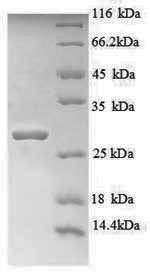

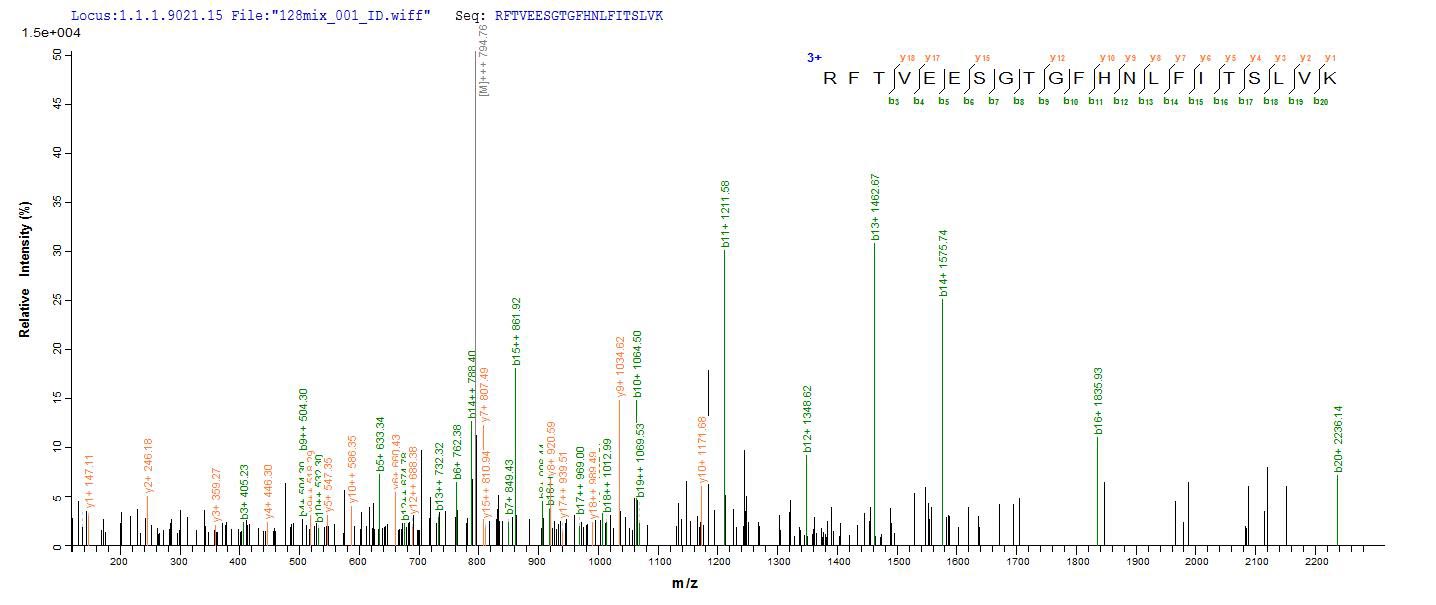

-AC1.jpg)
